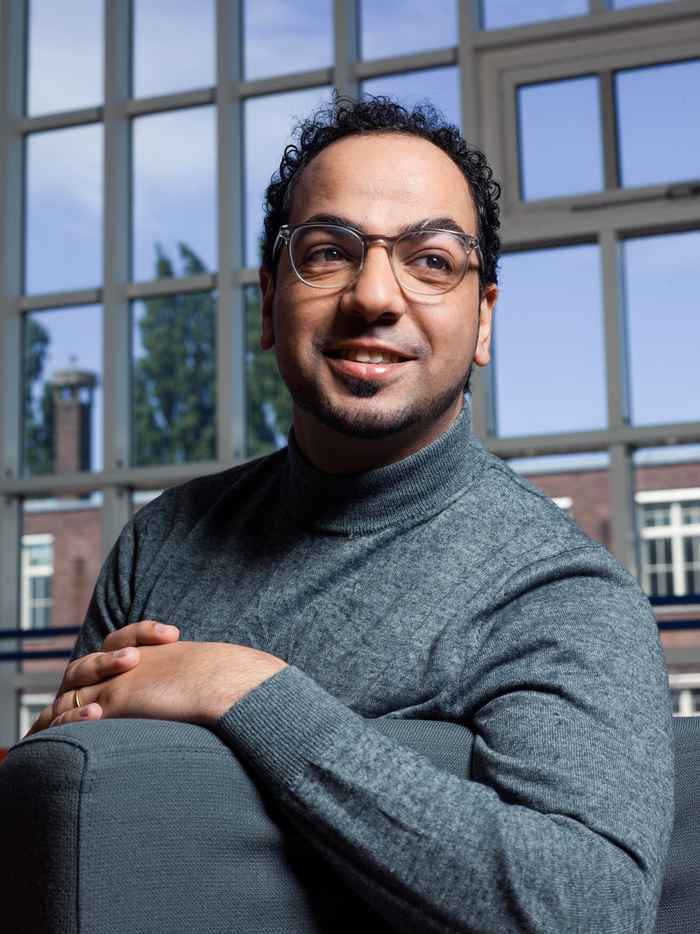Moataz Rageb

Who: Moataz Rageb (1987)
Studied: Master's Degree in Sociology
First job: helping out in my father's restaurant.
Favourite place at the UvA: The Spinhuis, which no longer belongs to the UvA, unfortunately. It had such a nice, homey atmosphere.
Essential: fellow students to work with and to discuss the material with.
Moataz Rageb (1987) is a Master's student in Sociology. Moataz, born and bred in Amsterdam, took a gap year after finishing secondary school. He worked long hours and became increasingly fascinated by documentaries about what motivates people and how societies work. After a great deal of online research, he discovered that the Sociology Bachelor's was a perfect match for his newly developed interests. He is currently pursuing a specialisation through the one-year Master's programme in Sociology.
What was the deciding factor in your choice to enrol in the Sociology Bachelor's programme?
‘The Sociology programme at the UvA was the highest ranked in the Netherlands. That was all I needed to know; I started my Bachelor's programme in 2014. The programme offers you the tools and concepts with which you can look at society in a different way and with which you can better understand social processes. I now know that societies are much more complex than you might think.'
The Master's Week took away any doubts I may have had.
Do you find the study material dry? It's mostly learning from books, right?
‘Not at all. In the first year of Sociology, of course, you mainly learn about the great, classical thinkers and how they shaped the tradition of sociology into what it is today. In the second and third year, you start to specialise, and you have room to choose the courses that you find interesting. I chose courses related to urban sociology. That quickly teaches you how to conduct sociological research. I began participating in the project Vooruit! during my second year. The initiative is aimed at students who are given a place to live in exchange for doing social work. It gave me a chance to apply what I was learning straight away. To that end, it is important to me to find ways to connect this research to real life. It gives meaning to the material, and you are able to directly give something back to the community.'
The International Classroom really broadens your horizons.
Does the UvA do enough to keep you motivated?
'You have to be keen to learn in order to study sociology; curiosity is essential. I do a lot in addition to my studies, because I want to create a certain impact with my knowledge. I was a member of Amsterdam United, the UvA's diversity platform, where I advocated for diversity policy. I was also a member of the student party UvAsoc!aal. As a student assessor, I met with the Executive Board to discuss how certain student problems can be solved in the microcosm of society that is the university. For me, the interaction between the knowledge and the practice in which you can apply it is very important. I do want to become a researcher, but only if my research actually serves a certain purpose. So yeah, the UvA provides me with more than enough opportunities to develop my talents.’
The Sociology programme was the highest ranked in the Netherlands.
In your opinion, what makes this Master's and the UvA so special?
'Well, I'm in an International Classroom in the Master's programme. This Classroom is based on the idea that an international group has added value for the students' learning process. It is a relatively new concept and is one of the UvA's internationalisation initiatives. When I am in that class and I interpret the things I learn according to the standards of the Dutch society in which I was raised, the international students act as a mirror. They say: yes, that applies to the context of the Netherlands, but we have a very different type of society in the U.S., where other processes are at work. It teaches you to put things in context more effectively. In essence, it broadens your horizons. The great thing about the UvA is that it is a product of the community, i.e. the combined efforts of students, lecturers and administrators. Everyone can be included in the improvement process. When I entered my degree programme at the UvA, there were aspects that I thought could be improved. I was able to contribute to that, and the university is constantly improving. For example, I argued for more diversity and social student involvement as a member of the student council, in the various committees in which I was active and as a student assessor.'